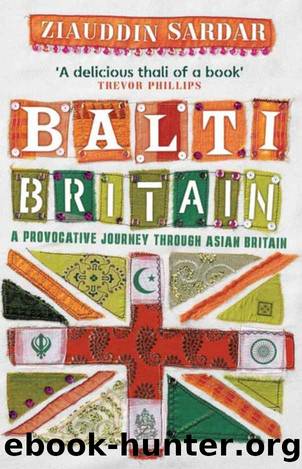Balti Britain: A Provocative Journey Through Asian Britain by Ziauddin Sardar

Author:Ziauddin Sardar [Sardar, Ziauddin]
Language: eng
Format: mobi
ISBN: 9781847086846
Publisher: Granta
Published: 2012-03-22T00:00:00+00:00
(17) Jagirs from Government of India, 1921.
Here had been feast after famine, and it had proved indigestible. Of course soldiers win medals. Yes, Dada had a number of medals; that much had always been evident from the photograph. But Sword of Honour? Had he really seen action in China and Kabul? My instinctive response was doubt. How could he, my father, a mere child when his father died, remember so exactly all those dates and specifics of events that long predated his birth? Indeed, how much of all this had simply been a product of Bawajiâs ever fertile imagination?
I examined Bawajiâs list with care. It was a litany of the North West Frontier wars. Bawaji had presented me with a family history in which the pages of Kipling came to life. I could hear the âBoots â Boots â Boots, marching up and downâ as the lusty soldiers cheered for âBobs, Bobs, Bobsâ, that âplucky Khandaharderâ âBobs Bahadurâ. There it was in black and white. According to my fatherâs list my Dada was one of those who marched behind Field Marshal Lord (Bobs) Roberts in the campaign that made him an icon of the Empire. I was devastated.
Dadaâs first military action, according to the list, was in the Second Afghan War (1878â80), one of those quintessentially colonial wars. The war was opposed by officials on the ground, who argued it was as unnecessary as it would be counterproductive. It had no purpose other than to impose the doctrine of imperial power on native peoples in reprisal, retaliation and revenge for their audacity in seeking to defend their independence. In this case, Afghan independence was fought over for geopolitical strategic reasons. In my time, such conflicts, the scourge of the Third World, were consequences of what was known, erroneously, as the Cold War. A century earlier it was more dismissively known by Kiplingâs epithet, the âGreat Gameâ â the subtext and subject of his novel Kim. Afghanistan lay between two imperiums: imperial Russian expansion across Central Asia and the British Empire in India. For most of the nineteenth century the delusional idée fixe of British foreign policy was Russian expansion, an ever-present threat to British interests in and tenure of India. So Afghanistan was trapped in a classic pincer between two imperial powers, like so many emergent nations in my time. Indeed, Afghanistan would relive this history as a recurring nightmare up to and including the present day.
Unfortunately for Britain the Afghans have never knowingly been compliant to any outside ruler. It did not help, in the First Afghan War (1839â42), that the commanders of Britainâs Indian Army were appointed on seniority and not ability, according to the established practice of the East India Company. When it marched into Afghanistan, the army was led by incompetents who made every mistake possible. There was death in abundant, superfluous horror. The Afghans defeated the British forces in a major engagement at the southern city of Khandahar. They fell back on Kabul, where again military misfortune overtook them.
Download
This site does not store any files on its server. We only index and link to content provided by other sites. Please contact the content providers to delete copyright contents if any and email us, we'll remove relevant links or contents immediately.
Harry Potter and the Goblet Of Fire by J.K. Rowling(3133)
Never by Ken Follett(2950)
Unfinished: A Memoir by Priyanka Chopra Jonas(2936)
Machine Learning at Scale with H2O by Gregory Keys | David Whiting(2360)
The Man Who Died Twice by Richard Osman(2338)
Fairy Tale by Stephen King(2138)
Will by Will Smith(2111)
Rationality by Steven Pinker(1796)
The Storyteller by Dave Grohl(1691)
The Dawn of Everything: A New History of Humanity by David Graeber & David Wengrow(1609)
The Dark Hours by Michael Connelly(1608)
The Stranger in the Lifeboat by Mitch Albom(1585)
Cloud Cuckoo Land by Anthony Doerr(1466)
New Morning Mercies: A Daily Gospel Devotional by Paul David Tripp(1443)
Friends, Lovers, and the Big Terrible Thing by Matthew Perry(1380)
The Becoming by Nora Roberts(1362)
Crying in H Mart by Michelle Zauner(1358)
Einstein: His Life and Universe by Walter Isaacson(1342)
A Short History of War by Jeremy Black(1324)
